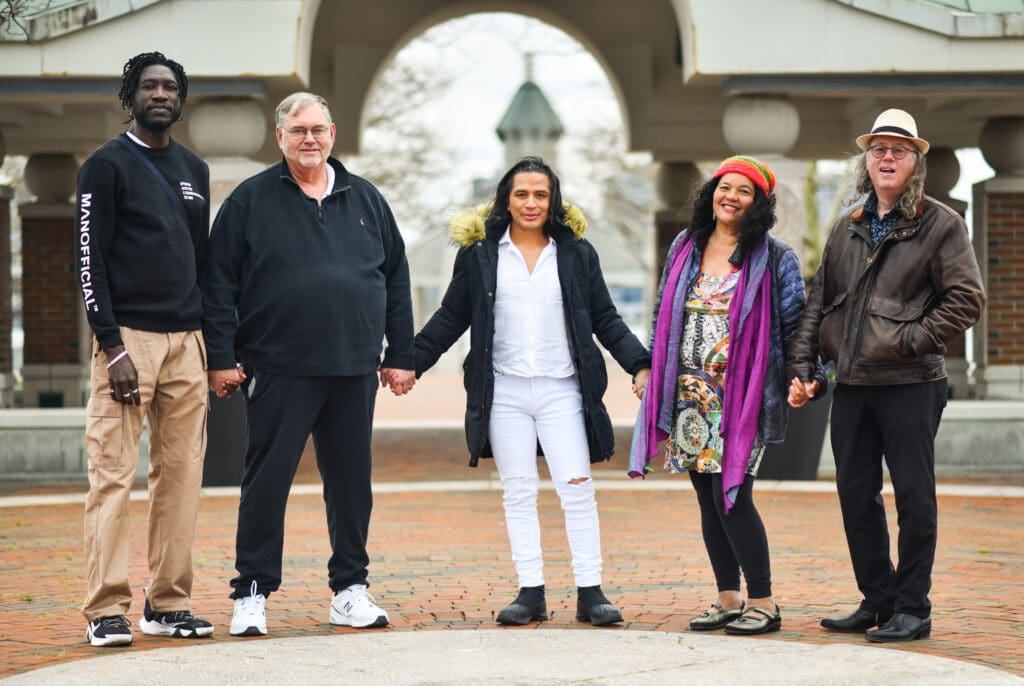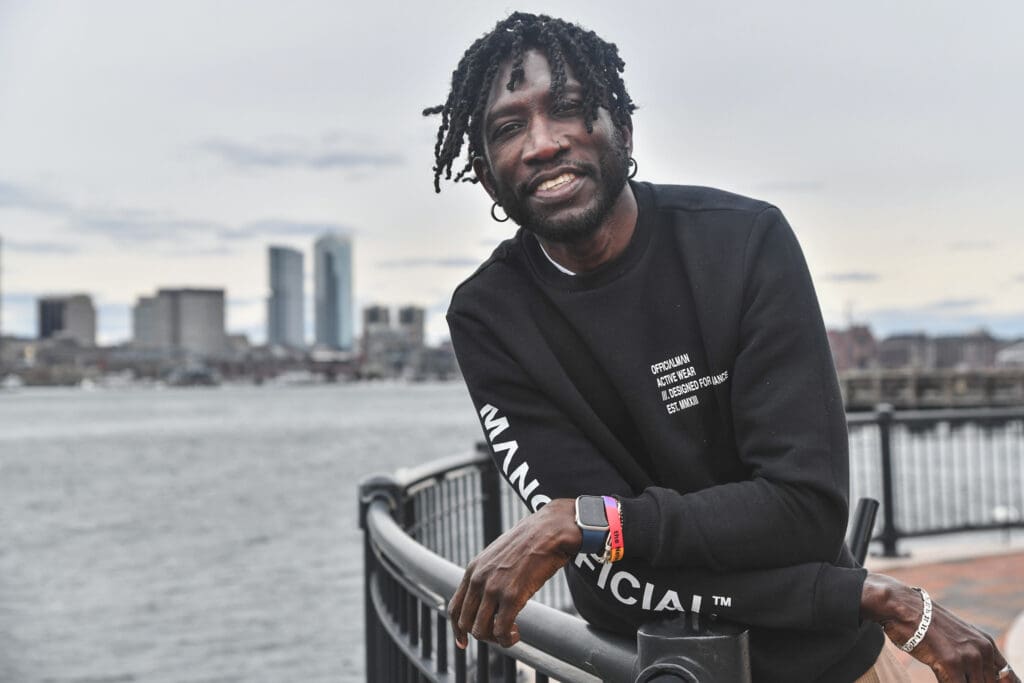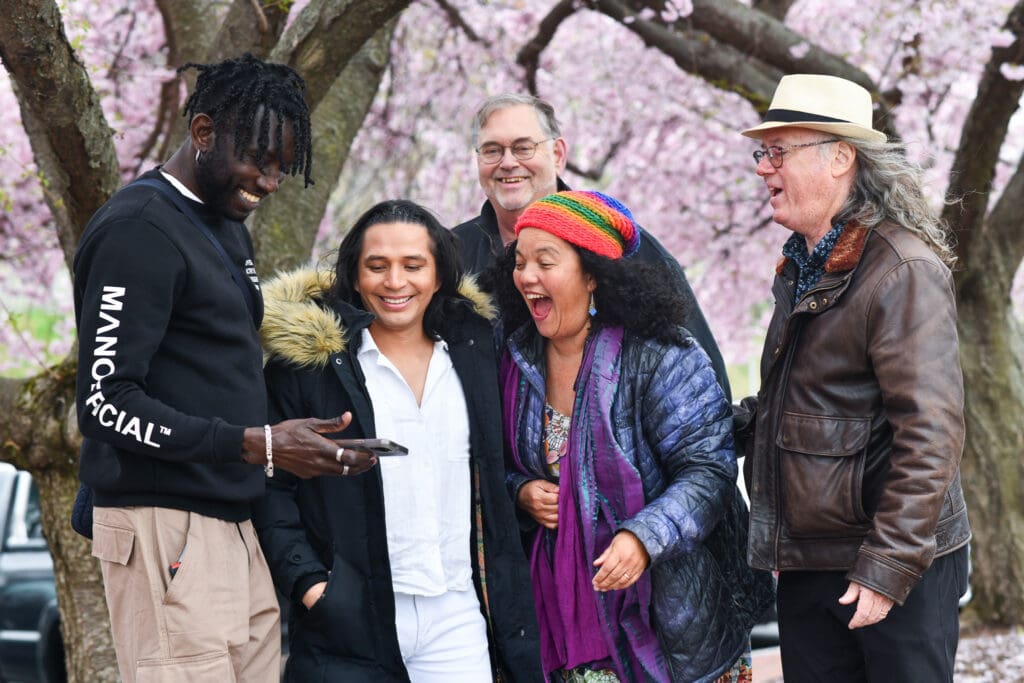
Sponsorship is a natural addition to Coro Allegro’s work
On Jan. 23, 2024, Rebeca Castro received the best gift she could ask for. At the age of 23, she stepped off a plane in Boston, Mass., and into a new life where she could be safe and live authentically in the United States.
As a member of the LGBTQ+ community in her home country of El Salvador, Rebeca faced constant discrimination and bullying due to her sexual identity. The LGBTQ+ community in El Salvador suffers torture, inhumane and degrading treatment, and excessive use of force. Thousands of El Salvadorans seek asylum in the U.S. each year because they lack basic protection and fear persecution for their sexual identity in their home country.
In June 2023, Rebeca sought assistance from the UNHCR, the UN Refugee Agency (or ACNUR in El Salvador) and applied for asylum. Even though she was warned that the process could take years, just 6 months later she was granted asylum and left her home to start a new life in the U.S.

When she arrived, she was celebrated with a birthday cake and welcomed as her true self by a group of sponsors who genuinely understood her struggle.
Uhuru—which means freedom in Swahili—is a private sponsor group of five, some of whom are musicians and members of the award-winning LGBTQ+ and allied classical chorus, Coro Allegro. Well known for a history of art and allied activism, the chorus commissioned, composed, and released the piece Aluta Continua, The Passion of David Kato Kisule in 2016, as a tribute to the life and legacy of the slain LGBTQ+ Ugandan activist.
In 2023, the Uhuru private sponsor group chose to extend their work by supporting and welcoming LGBTQ+ refugees to the United States through the Welcome Corps.

Inspired by his own journey to the United States, lead sponsor John Abdallah Wambere, or ”Long Johns” as he is known by his friends, is a long-time activist and pillar of his community. He came to the U.S. during a tumultuous time in Uganda, arriving just two days after the president signed into law The Anti Homosexuality Act of 2014. He shared that he was outed by the media in Uganda several times, and that those close to him advised that he should not return to his home country. He embarked on a journey to the U.S., seeking asylum with help from GLAD, a civil rights organization that advocates for justice and equality for the LGBTQ+ community.
Long Johns has devoted the past 25 years of his life and work to activism and public service. His experience as a refugee and community activist supported his decision to form a private sponsor group and called on his close friend Yoshi Campbell, the former executive director of Coro Allegro, to join him.
The same experience of my asylum is what I have used to support newcomers coming into the U.S. because walking through that system has been very helpful for me to know what are the basic needs when you arrive here. I had the experience as an activist and the reality of life of an LGBTQ person being discriminated against.
John Abdallah Wambere
Yoshi Campbell and her husband, Tom Beyer, each have a deep experience that fuels their sponsorship journey. Yoshi is the daughter of a Japanese immigrant and a self-identified member of the queer community.
“I’ve had a little bit of a window into some of the difficulties of integrating within United States society, especially around issues of race and the complexities of that,” she said.
Tom’s father worked in foreign service, and the time he spent in Africa made an impression on him that has stayed with him into adulthood. One thing that he noticed during his time in Africa was that “the smaller, more personal projects tended to just resonate better and seemed to do more than the sort of big corporate efforts.” For Tom, the essence of the Welcome Corps program was this notion of a small, impactful, community-based project.
Yoshi added that she felt confident in the group’s ability to lead a successful sponsorship program because of Long Johns’s leadership and expertise. “Working with Long Johns is going to make it so easy because he’s been doing this work and he’s got ties in the community,” she said.
Another member of Team UHURU, David Hodgkins, is a teacher at the Commonwealth School of Boston and serves as the artistic director and conductor of Coro Allegro. While he does not identify as LGBTQ+, he considers himself a lifelong ally. His decades-long involvement leading Coro Allegro has further solidified his allyship.
The connections that David has made throughout his community and across the country through Coro Allegro have been instrumental in the group feeling supported in their sponsorship efforts by their network. One community group that Team UHURU is connected to is the United Parish in Brookline that offers resources such as food, clothing, and housing.
Yoshi added that Massachusetts provides a safe and inviting place to live, specifically for the LGBTQ+ community.
“Massachusetts in general is a good place for an LGBTQ+ [individual] because it is the first state that had marriage equality in the U.S., and our governor is a lesbian. I feel like there are lots of organizations in this area that we can reach out to,” she said. “There’s no need for us to invent the wheel. There’s so many people who are doing that wheel building.”

With its group and community support in place, the team reflected on the impact that a successful welcome could have on Rebeca as she built a new life in the United States. “Unfortunately, some of us arrived here, and we didn’t have this opportunity for anyone to welcome us,” Long Johns said. “And we all just started from nothing.”
Yoshi added, “It is an honor to get to provide some kind of base, some kind of open door for someone to walk through, to build their new life,” she said. “You’re not alone in this process.”
All of that kindness, acceptance, and support was evident to Rebeca when she arrived in Boston, where her biggest hope for her future is to live authentically and comfortably as a woman.
“I’m very happy in Boston. It’s a very nice city. Clean, lots of cultural activities,” she said. “And I’ve found so many nice people—angels who have assisted me—guiding me and who have told me ‘It’s just a process. You’re just starting, settling down here, and later on as time will pass by, you will become the person that you want to be.’ So it’s very reassuring.”
Through this experience, Rebeca has been welcomed into a country where she has access to medical and mental health care that allows her to be protected and supported. She also is part of a community with members who have shared lived experiences and encourage her to be who she really is, with peace of mind that she can do so without fear of harm or persecution.
“I was invited to a concert and they were all telling me, ‘Welcome to America. You will be fine,’” she said. “They have all been very kind to me, and it’s really amazing. I feel so fine living here because they accept me as I am and not as it was in El Salvador where I was really living a tough time because of my sexual orientation. Whereas here, none of that happens.”

She said being a sponsor is one of the most rewarding experiences anyone can undertake. “Helping people, helping others, is really the best thing you could do in the world. Assisting others to succeed, to get ahead, it will be a blessing for them from God because they are really making a change in people’s lives.”
My biggest dream is to become a woman, because that’s my identity as a person. I was a girl. I feel like a girl, and I want to get ahead in life as a woman and live my life.
Rebeca Castro